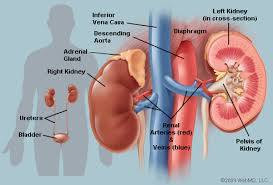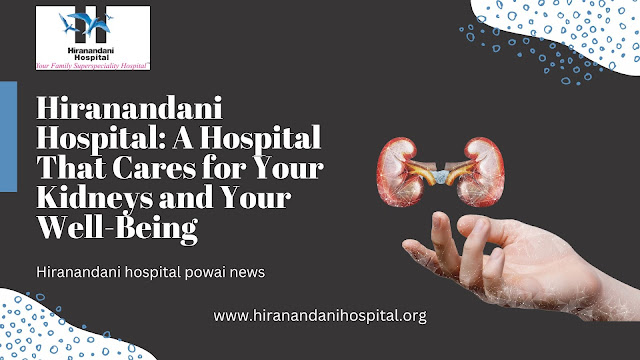Responsibility for and activities to maintain the health of the kidney
The kidneys are two brownish-red, fist-sized, bean-shaped organs that are located on either side of the spinal cord at the base of the rib
cage. It measures about 4.5 inches (12 cm) in length in adult mammals.
The following are the roles that they play as the main organs in the human excretory
system:
1. Blood Filtration: The kidneys are essential for filtering blood to create urine by
eliminating waste minerals from the blood.
2. Controls Acid-Base Equilibrium - The acid-base balance in the human body is
constantly in a state of delicate equilibrium, or "pH," which is a
measurement of the concentration of hydrogen ions. The normal pH range for blood
is between 7.35 and 7.45. Kidneys eliminate the excess of these and conserve
the one that is less in order to maintain the healthy spectrum of these
chemicals.
3. Eliminating waste from the
bloodstream - To prevent any form of intoxication build-up, the kidneys filter
poisons and other waste materials.
4. Vitamin D activation - The
kidneys convert calcium phosphate (calcifediol) into calcitriol, which
dissolves in the blood and keeps calcium and phosphate levels in the body
stable, promoting stronger bone formation.
5. Maintains Blood Pressure Under Control: The kidneys emit an enzyme called
"Renin" that causes the liver to produce "Angiotensinogen,"
which is then changed into "Angiotensin l," which is then changed
into "Angiotensin ll," in the lungs. Angiotensin ll constricts the
blood vessels to raise blood pressure; however, if blood pressure is already
high, the kidneys produce urine, which eliminates the liquid that is now moving
through the body and lowers blood pressure.
6. Transporting
nutritional value into the bloodstream - Kidneys assist in storing minute
amounts of nutrients including vitamins, minerals, and proteins to ensure the
potent elements get where they are needed and may be utilised by cells to
repair throughout the body.
7.Controls Electrolytes and Hormones Controlling electrolytes (such as salt) and hormones is another crucial goal (like testosterone).
Any excess of them is eliminated, and if there is a deficiency, it is put back into circulation to maintain a balanced presence.
Since the kidneys perform important tasks, CEO of Hiranandani Hospital Kidney, Dr. Sujit Chatterjee, a specialist, discusses how one can take good care of their kidneys:
1. Be aware of over-the-counter medications -
If you regularly take over-the-counter (OTC) medications for chronic problems including headaches, stomachaches, body aches, or arthritis, you run a high risk of damaging your kidney(s).
Dr. Sujit Chatterjee emphasised the recommendation made by the National Kidney Foundation that OTC medications should not be taken for any chronic pain for longer than 10 days as Ibuprofen and other NSAIDs may cause temporary or even permanent kidney damage.
2. Correct your Blood Pressure - When it comes to blood pressure, a value of 120/80 is regarded as normal.
If a person has problems with stress, high cholesterol, obesity, cardiovascular disease, or any of these, they may be at risk for high blood pressure.
This could significantly hinder the kidney's ability to operate properly.
3. Drink plenty of fluids without going overboard. Water helps lower sodium and toxin levels, which lowers the chance of renal failure.
Therefore, it is a good habit to stay hydrated.Furthermore, according to Dr. Sujit Chatterjee, there is no research to support the idea that drinking too much water can improve renal function.
Therefore, 1-2 litres per day should be adequate.
4. Take part in physical exercise - Exercise is good for more than just keeping your weight in check.
It is not necessary to engage in strenuous exercise; even simple activities like walking, cycling, or dancing can be quite beneficial because they assist to maintain blood pressure, which improves blood circulation.
5. Control blood sugar- Our body converts the food we eat into glucose, which is a type of sugar.
When body cells are unable to utilise and further break down blood sugar, a condition known as high blood sugar develops.
Thus, the kidneys must spend additional effort to purify that blood, which causes kidney damage.
"Not acting on these can lead to an extra burden on our kidneys, and endangering the kidneys is no choice because of the vital tasks implemented by the organ," the CEO of
Hiranandani Hospital kidney transplant concluded.



Comments
Post a Comment